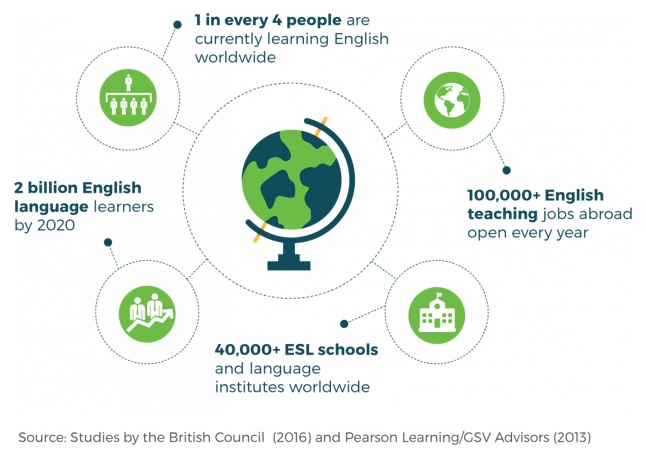One of the most desired jobs in the education sector is to become a TEFL teacher. It not just gives the opportunity to change student’s lives but also gives the opportunity to teach in the desired destination and to live there as well. According to teachaway.com, there are more than 100,000+ jobs open every year globally.

Source: www.teachaway.com/teach-english-abroad
One of the important aspects for those TEFL teachers who have pursued courses like 120-hour in-class TEFL course in Mumbai is to get a working permit and visa. However, with the ever-changing visa regulations and increasing national security concerns, it's becoming more challenging to obtain the necessary documents to work legally in foreign countries.
However, there’s no need to worry, we have created this helpful blog post which contains a comprehensive overview of the steps you need to take for the legalization of documents to teach in your favourite destinations.
So, without any further ado, let’s get started.
What is Document Legalization and Authentication?
Document legalization is the process of verifying the authenticity of a document by taking additional steps to justify its legitimacy. This is done to ensure that the documents are not forged or fake and that they comply with the laws of the country where the foreign worker intends to work.
Document authentication is the process of obtaining an official certification that proves the authenticity of a document. This is often done by a government body or a notary public.
When it comes to TEFL teachers abroad, document legalization and authentication typically involve the legalization or authentication of a TEFL certificate, a degree, and a criminal background check.
Now, before getting to know some essential steps to legalize documents. We have a question for you. Do you follow us on Social Media? We regularly share upgraded educational content, tips, feedback, and more. Check us out by clicking the profiles here - Facebook / Twitter / LinkedIn / Pinterest / Instagram / YouTube
Essential steps to legalize documents
1. Criminal Background Check
One of the most important steps to legalize documents is to obtain a criminal background check because almost every country wants its workers to have a clean criminal record. One needs to request for a criminal background check from the relevant authority according to their home country's rules.
For instance, Indian citizens can obtain their criminal background check from the District or Supreme Court, US citizens can obtain from the FBI, Canadian citizens from the RCMP, UK citizens from the government, Irish citizens from the Garda, Australian citizens from the AFP, and New Zealand citizens from the Justice Department.
The cost of obtaining a criminal background check varies depending on the country but typically ranges from $15 to $42 approx.
2. Notarization
The second step in legalizing documents is notarization. This involves having the documents certified by a local public notary or solicitor. The notary public is authorized to perform certain legal formalities, such as certifying documents. They will confirm that the qualifications are not forged or fake and that they meet the requirements of the country where the worker intends to work.
It is important to note that getting notarized comes at a cost, and the worker will need to cover these expenses independently. Moreover, the documents that need to be notarized depend on the country where the worker intends to work.
3. Proof of No Criminal Activities
The third step in legalizing documents is obtaining proof of no criminal activities. This involves notarizing the criminal background check obtained in step 1. This step is necessary because some countries require notarized criminal background checks.
4. Apostille Stamp
The fourth step in legalizing documents is obtaining an Apostille stamp. This is a fancy way of saying "internationally notarized" versus simply notarized. The Apostille stamp is necessary if the country where the worker intends to work is not a party to the Hague Convention Abolishing the Requirement of Legalisation for Foreign Public Documents.
The Apostille stamp is obtained by submitting the documents to the relevant authority in the worker's home country. Fortunately, getting an Apostille stamp is a pretty quick and easy process in most countries, and the worker can obtain it with relative ease.
5. Embassy Visit
The final step in legalizing documents is visiting the embassy of the country where the worker intends to work. The worker will need to bring their shiny, freshly legitimized documents to the embassy and apply for a visa. Alternatively, they can use a reliable company to offer this service.
It is important to note that the process of legalizing documents can take a considerable amount of time, and the worker should budget enough time to complete each step.
6. TEFL Certificate Authentication
For TEFL teachers abroad, the most important document that needs to be legalized is the TEFL certificate. Due to recent changes in regulations, countries like China and Vietnam require TEFL certificates to be authenticated by a government body.
The legalization of documents must be done in the country where the document originates. It can get verified by the country Embassy from which you have got the TEFL certificate.
Helpful Tips for Document Legalization
The process of legalizing documents can be time-consuming and costly. To help TEFL teachers navigate this process, here are some pro tips:
1. Plan Ahead
The worker needs to budget enough time to complete each step in the process. Four weeks should be the bare minimum budgeted to complete this process.
2. Use Original Documents
Copies are not acceptable when it comes to notarizing. The worker needs to have their original certificate/document handy.
3. Budget Accordingly
Legalizing documents can be costly. As the worker budgets their teach abroad start-up costs, they should factor in extra expenses for any hiccups that arise such as these. If they also require a work visa/permit, they should budget for this as well.
4. Relax
The worker should not worry about their documents being fake. The notarizer is sure to recognize their TEFL and related documents as legitimate. They just need to budget for money and time spent and they will be well on their way to the classroom in no time.
Legalization Of Documents Is Necessary For every TEFL Teacher
Every aspiring or experienced TEFL teacher who has pursued courses like 120-hour in-class TEFL course in Mumbai has one common goal which is to teach in their favourite destination to help transform learner's life and to live an exotic life at the same time.
However, to teach in any foreign destination you need proper legalized documents with you. The above-mentioned steps will help you to gain legalized documents so that without any stress you can teach and live your life to the fullest in your favourite destination.
Find the right course for you and try out the course. Call us at: 1800-212-6400. You can also mail us at act@asiancollegeofteachers.com.
Written By : Abhishek








